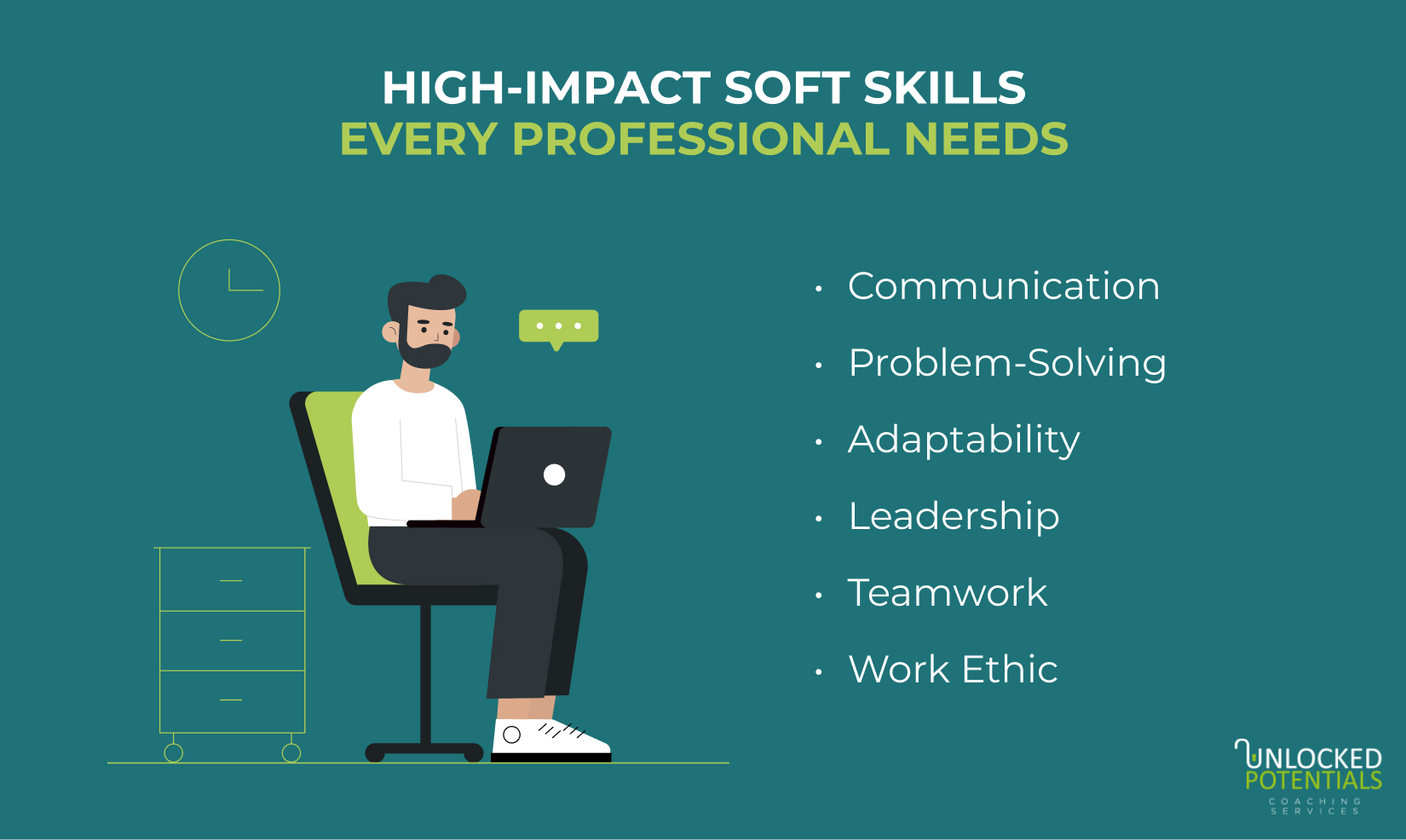What Are Soft Skills? Examples and Importance to Career Growth

Employers value soft skills because they often determine how well someone performs beyond the basic requirements of the job. Strong technical skills may secure an interview, but soft skills frequently influence who is hired, promoted, or trusted with greater responsibility.
In this blog, we will define soft skills and explain why they are essential for career growth. We will outline key examples employers look for, provide guidance on how to develop them, and share practical tips on demonstrating them in your CV, cover letter, and interviews. The aim is to help you recognise and strengthen these skills so you can present yourself as a capable, well-rounded professional.
What Are Soft Skills
Soft skills are the personal and interpersonal traits that influence how you interact with others, approach your work, and respond to different situations. They shape your ability to communicate, collaborate, and adapt effectively in the workplace.
These skills are different from hard skills, which are technical, measurable abilities specific to a job or industry, such as coding, data analysis, or operating machinery. Hard skills can often be taught through formal training or education, whereas soft skills are developed through experience, self-awareness, and consistent practice.
Soft skills are sometimes called interpersonal skills, people skills, or essential skills. They include abilities such as clear communication, adaptability, problem-solving, teamwork, leadership, and empathy. Because they are transferable across roles and industries, they play an important role in both securing a job and building a long-term career. Employers look for candidates who not only have the technical expertise to perform tasks but also the personal skills to work effectively with colleagues, clients, and stakeholders.
Why Soft Skills Matter for Career Growth
Soft skills influence how you work with others, manage challenges, and contribute to organisational success. Employers often value them as highly as technical abilities because they affect performance in almost every role. Here are the key benefits of soft skills for career growth include:
- Improved hiring potential – candidates with strong soft skills often stand out when technical qualifications are similar.
- Better teamwork – clear communication, adaptability, and empathy help maintain productive and collaborative working relationships.
- Stronger leadership – skills such as motivation, delegation, and conflict resolution are essential for managing teams effectively.
- Enhanced client relationships – active listening and empathy build trust and encourage long-term business connections.
- Higher retention rates – employees with strong soft skills tend to have greater job satisfaction and stay longer in their roles.
- Transferability across industries – soft skills can be applied in different roles and sectors without the need for extensive retraining.
Soft skills cover a wide range of abilities, and the specific ones employers value most can vary by role and industry. Below are key soft skills to help you identify and strengthen the ones most relevant to your career.
-
Communication
Communication is the ability to share information clearly and understand others effectively. It includes both verbal and written skills, as well as active listening. Strong communication helps prevent misunderstandings, supports collaboration, and ensures that tasks and expectations are clear. Related abilities include public speaking, giving constructive feedback, and adapting your message for different audiences.
-
Problem-Solving
Problem-solving is the capacity to identify issues, analyse them, and find workable solutions. It involves thinking critically, considering multiple perspectives, and making informed decisions. This skill is valuable in almost every role, as challenges and unexpected situations are part of daily work. Related abilities include creativity, logical reasoning, and decision-making.
-
Adaptability
Adaptability is the ability to adjust to new conditions, priorities, or ways of working. It helps you remain effective when circumstances change, whether that means learning new tools, handling shifting deadlines, or working with different teams. Related abilities include flexibility, openness to feedback, and resilience.
-
Leadership
Leadership is guiding, motivating, and supporting others to achieve shared career goals. It is not limited to management roles; leadership can be shown in any position by taking responsibility, setting a positive example, and helping others succeed. Related abilities include delegation, conflict resolution, and strategic thinking.
-
Teamwork
Teamwork is working cooperatively with others to achieve objectives. It requires listening, respecting different viewpoints, and contributing to a shared outcome. Good teamwork fosters trust and makes it easier to overcome challenges together. Related abilities include collaboration, compromise, and relationship-building.
-
Work Ethic
Work ethic is the commitment to meeting responsibilities and delivering quality results. It reflects reliability, professionalism, and attention to detail. A strong work ethic builds trust with colleagues and managers and can lead to greater opportunities over time. Related abilities include time management, organisation, and accountability.
How to Develop Soft Skills
Soft skills can be strengthened over time through consistent effort and reflection. The following steps can help you develop them in a practical and sustainable way:
Step 1. Build self-awareness
Understand your strengths and the areas where you can improve. Reflect on past experiences to identify patterns in how you communicate, solve problems, or work with others.
Step 2. Practise in real situations
Use your daily work as an opportunity to apply and improve soft skills. Volunteer for projects, take the lead in meetings, or work with colleagues from different departments to broaden your experience.
Step 3. Seek feedback
Ask for constructive feedback from managers, mentors, or trusted colleagues. Specific examples can help you see where your approach is effective and where changes might be needed.
Step 4. Pursue formal training
Courses, workshops, and mentorship programmes can provide structured guidance and targeted strategies for developing skills such as leadership, conflict resolution, or time management.
Emotional intelligence is an important focus when building soft skills. It combines self-awareness, empathy, and relationship management, allowing you to recognise and manage your own emotions while understanding and responding to the emotions of others.
How to Showcase Soft Skills in Your Career
Demonstrating soft skills effectively can make a strong difference in job applications and professional opportunities. Employers often look for clear evidence that you can apply these skills in real situations.
Resume
Include a dedicated skills section that lists your strongest soft skills, using wording that matches the job description. For example, if the role calls for “collaboration” or “adaptability,” use those exact terms where they genuinely apply to your experience. You can also reflect soft skills in your work history by describing how you achieved results through communication, leadership, or problem-solving.
Cover Letter
Select one or two soft skills that are highly relevant to the role and provide concise examples of how you have applied them. For instance, you might explain how your ability to coordinate with multiple teams led to a project being delivered ahead of schedule.
Interviews
Use specific examples to illustrate how you have applied soft skills in past roles. When describing a situation, explain the challenge, the actions you took, and the results achieved. Employers will also observe soft skills directly during the conversation, such as how clearly you express ideas, how attentively you listen, and how you respond to questions.
Common Misconceptions About Soft Skills
There are several misunderstandings about soft skills that can lead people to undervalue or overlook them. Addressing these myths can help you recognise their full importance in your career.
- “Soft skills can’t be learned.”
While some people may naturally excel in certain areas, soft skills can be developed with practice, feedback, and reflection. Structured training, mentorship, and real-world experience all contribute to improvement over time. - “They’re less important than technical skills.”
Technical expertise may secure an opportunity, but soft skills often determine long-term success. Employers need people who can collaborate, adapt, and solve problems effectively. In many cases, strong soft skills can make up for gaps in technical knowledge, but the reverse is less common. - “Soft skills are only for client-facing roles.”
These abilities are valuable in every position. Even in roles with minimal direct contact with customers, you still need to work with colleagues, follow processes, and respond to changes constructively. - “Soft skills are fixed personality traits.”
While personality may influence how you approach situations, skills such as communication, adaptability, and leadership can be refined through deliberate effort.
Frequently Asked Questions
What are the most important soft skills employers look for in the UAE?
In the UAE, employers often highlight communication, adaptability, teamwork, cultural awareness, and problem-solving as essential. These skills are valued because many workplaces are diverse and fast-paced, requiring employees to work effectively with people from different backgrounds and adapt to change.
Can soft skills be developed if I am not naturally good at them?
Yes. Soft skills improve with practice, feedback, and self-awareness. You can strengthen them by taking part in training, working on real projects, and seeking guidance from mentors or coaches. At Unlocked Potentials, we focus on building these skills step-by-step through targeted career coaching.
How can I show my soft skills in a job application?
Include a skills section in your CV that matches the keywords in the job description. Provide short examples in your cover letter or interview answers that show how you have applied these skills to achieve positive results.
Why are soft skills important for career growth in the UAE market?
Many roles in the UAE involve working in multicultural teams and dealing with international clients. Soft skills help you build trust, manage differences, and collaborate effectively, which can lead to better performance, promotions, and long-term career opportunities.
Do employers in the UAE value soft skills as much as technical skills?
Yes. Technical skills may help you meet job requirements, but soft skills often determine how well you perform in the role and fit into the team. Employers increasingly see them as a key factor in long-term success and retention.
- September 2025
- August 2025
- July 2025
- June 2025
- May 2025
- April 2025
- March 2025
- February 2025
- January 2025
- December 2024
- November 2024
- October 2024
- September 2024
- August 2024
- July 2024
- June 2024
- May 2024
- December 2023
- November 2023
- August 2023
- July 2023
- June 2023
- May 2023
- April 2023
- March 2023
- February 2023
- January 2023
- December 2022
- November 2022
- October 2022
- September 2022
- August 2022
- July 2022
- June 2022
- May 2022
- April 2022
- March 2022
- February 2022
- January 2022
- December 2021
- November 2021
- October 2021
- September 2021
- August 2021
- July 2021
- June 2021
- May 2021
- April 2021
- March 2020
- February 2020
- January 2020
- December 2019
- November 2019
- October 2019
- September 2019
- August 2019
- July 2019
- June 2019
- May 2019
- April 2019
- March 2019
- February 2019
- January 2019
- December 2018
- November 2018
- October 2018
- September 2018
- August 2018
- July 2015
- May 2014









